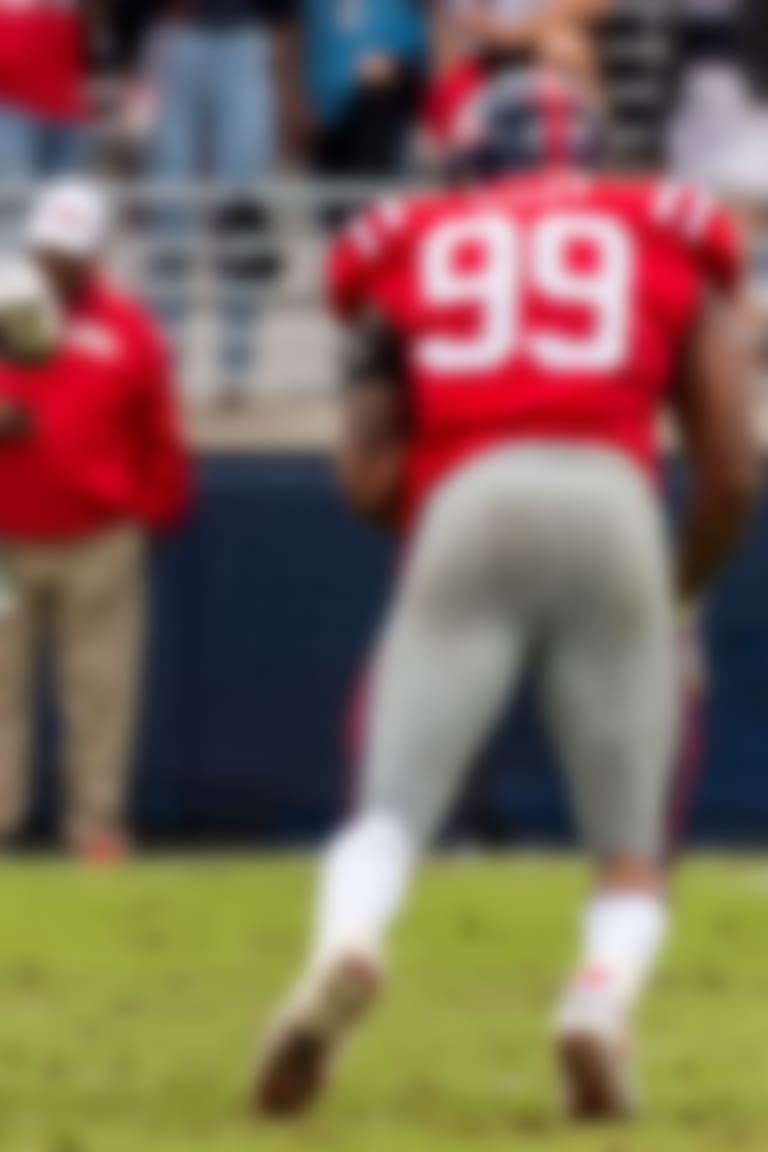Five years ago, Prince Tega Wanogho came to the U.S. with hoop dreams, but now football -- a sport he knew nothing about while growing up in Nigeria -- has turned into his golden ticket
By Chase Goodbread | Published Sept. 25, 2019
AUBURN, Ala. -- When Todd Taylor met Edgewood Academy's new exchange student at the Montgomery Regional Airport in late July 2014, once hands were shaken and pleasantries swapped, he suggested Prince Tega Wanogho start his new life in the United States by accompanying him to Delta baggage claim to retrieve his suitcase.
"This is it," Wanogho said, motioning to the small backpack that hung from his shoulder. "This is all I have."
Inside that backpack was one change of clothes, a Nigerian passport and a student visa, a few family photographs, a bible gifted to him by his mother, and $20 cash he'd converted from his country's depressed naira currency. Those were the only tools he brought to pursue his goal of a college basketball scholarship and whatever prosperity he could create for his family back in Delta State, Nigeria. It was light traveling, indeed, for a one-way flight to a new world and no immediate plans to return home.
"I didn't want to bring too much old stuff to a new beginning," he says.
He wore jeans, a long-sleeved shirt and a jacket -- way too heavy for a sweltering Alabama summer. But he was coming from a part of the world where there is no summer, or even four seasons. Nigeria has only two: wet and dry, and Wanogho had left his homeland in the heart of the March-to-September rainy season. In his hand was an old, dead Nokia phone that didn't interface with chargers sold in the United States. When its battery gave out somewhere along his 18-hour flight, with connections through Amsterdam, New York and Atlanta, the phone became trash.
Life was moving at a breakneck pace for a 6-foot-7 power forward whose shoe size (17) was outpacing his age (16). But the real acceleration hadn't even begun.
Within eight months of his arrival to the United States, his plan to play college basketball unraveled, and football -- a sport he knew absolutely nothing about -- became his new, golden ticket. He'll cash it next spring when his transformational experience in the U.S. makes him a prized selection in the NFL draft, but that notoriety has come at a troubling price. The attention that comes with his success can be met with joy by some in his native homeland, but with jealousy by others. And with that comes a set of worries for Wanogho that his circle of support in America can't fully comprehend.
It's been a heavy burden for anyone's shoulders to bear, even a pair as wide as Auburn's 305-pound senior left tackle. But this much he knows: football has created an opportunity for himself and his loved ones that he never thought possible when his flight to the U.S. first hit the MGM tarmac. As it turned out, he brought a few more tools than his backpack revealed -- namely, a rare physical skill set better suited to protecting quarterbacks than dunking basketballs.
And who needs a suitcase for that?
From purely an academic perspective, the arrangement could be seen as temporary -- Wanogho would finish high school while living with Edgewood assistant basketball coach Todd Taylor's family, and hopefully move onto college basketball from there. On the matter of guidance in life, however, Princess Onome Wanogho intended for the Taylors' relationship with her son to be permanent.
The mothers had spoken only a few times before -- a couple of phone calls, and some Facebook messaging. Still, they built a personal connection as Christians, and Christy Taylor considered it a testament to Princess Onome's faith that she would entrust one of her nine children to the Taylor family based on so little preliminary communication. Christy's first instinct as a new "host mom" was to have Wanogho call his mother and let her know his journey to the U.S. was completed safely. Then she took the phone after Tega had done so, and quickly realized how strongly his mother believed in her son's ability to adapt as an American.
"I asked her what his favorite foods are," Christy said, tears welling in her eyes recalling her now-deceased, long-distance friend. "And she says, 'His favorites do not matter now. You cook, and he will eat.' "
Assimilating to American cuisine was Wanogho's quickest and easiest transition. Zaxby's chicken became an early and lasting favorite, and his appetite was voracious. Lauren Fleming, the Taylors' oldest child, recalls her first visit home after Tega's arrival. She came downstairs one morning and saw her mother juggling multiple trays of biscuits.
"I tell my mom I'm going to go back to change (from pajamas) into nicer clothes, because it was obvious company was coming over for breakfast," said Fleming, the director of events and outreach for the Senior Bowl.
"Nobody is coming over," Christy replied. "I've been doing this since Tega got here."
Despite Wanogho's instant taste for American food, the cultural divide was steep.
As a child, Tega thought American kids were spoiled because they could pull money from public boxes at will. He later learned those greedy ATM grabs had to be backed by deposits. Then there were the ignorant confusions on this side of the Atlantic. Tega was asked so often at Edgewood whether he'd hunted lions or tigers that he began, in fun, attributing a scar on his right arm to a tiger scratch.
The first time Christy took Tega clothes shopping, she handed him a pair of shorts to try on, he wrapped them around his head and declared that they would fit just fine. If half the length of the waistband fits well around the neck, he explained, the shorts will fit the waist just as well.
"I don't know what you're doing," Christy replied, "but you're trying those on in the dressing room before we get them. "
Of course, there was no need. Having passed Wanogho's neck test, the shorts fit perfectly.
Edgewood coach Bobby Carr knew Wanogho had arrived in the U.S. to pursue a basketball dream, but surprisingly had little trouble convincing him to give football a try. He certainly had no doubt an athlete of Wanogho's size, even with no experience, could be a big help to a team that competed in the Alabama Independent Schools Association, a collection of smaller schools, often with limited roster numbers, that competes apart from the regular state association.
It would be a fine way, Carr told him, to stay in good physical shape while he awaited the start of basketball season. Wanogho didn't tell his mother in Nigeria that he was participating; she surely would have objected.
"Football wasn't the plan," Wanogho said.
During Wanogho's first week in the United States, he showed up for his first football workout and was measured at 6-foot-7, 225 pounds. Carr also was timing his players in the 40-yard dash in advance of preseason practice. There were certainly no pairs of size-17 cleats at Edgewood, so Carr timed Wanogho in hi-top tennis shoes, on grass rather than a track, and couldn't believe the two readings: 4.62 and 4.64.
Carr already knew a special athlete was coming to Edgewood after seeing a video of Wanogho dunking basketballs in Nigeria in advance of his enrollment. But the 40-yard dash times let him know just how special.
"I'd never seen a kid that big move that fast," Carr said. "But I had no doubt he could impact the team without much base knowledge."
Or, as it turned out, none at all.
The Taylors' son, Zach, taught Wanogho the different parts of the uniform, and how to fit his jersey over empty shoulder pads, then put both on at once. Eleven players per side? It had to be explained. The object of the game and the definition of the line of scrimmage? Those concepts alone took time to absorb.
Carr put him at defensive end with the simplest of marching orders: chase the ball. The day of his first game, Zach and an assistant coach explained to him the concept of scoop-and-score for defensive players recovering a fumble. That night, in his first game, he picked up a fumble and scored. He also served as Edgewood's kickoff specialist -- his background in soccer gave him a powerful leg -- and he'd frequently make the tackle on kickoff returns, covering his own kicks unblocked because the opposition wasn't inclined to get in his way.
Still, Wanogho's head was swimming in basics, and things were about to get much more complicated.
He initially entered Edgewood as a 16-year-old junior, but when the school received more information from his Nigerian equivalent of an academic transcript, they realized he had the necessary credits to be reclassified as a senior. He adapted to classroom work with ease, making straight A's at Edgewood.
"I used to get on our players who were making C's in English," Carr said. "I told them, 'Tega just got here from Nigeria and he's making an A. You've lived here all your life and you get a C. ' "
Wanogho's academic standing, however, put an even bigger rush on his athletic development. Reclassifying as a senior meant he'd play just one year of high school sports, instead of two. Before he'd even played his first high school basketball game – which is where his plan to earn a college scholarship was supposed to have begun – top football programs were already buzzing with excitement about him. A game film of Wanogho that Carr had distributed to top colleges had caught wildfire; AU coach Gus Malzahn said Wanogho's combination of size and speed were so evident from even a small sample of film, that a scholarship offer was merited after the AU staff had a chance to meet him.
Soon after the attention began to intensify, college coaches learned of Wanogho's reclassification, which meant they would have to squeeze him into the 2015 signing class, rather than 2016. Barely more than two months after Wanogho had to be shown where to insert pads into the pockets inside a pair of football pants, SEC coaches were in the Taylors' living room, inundating him with attention and vying for his signature. He was offered scholarships by Clemson, Georgia, LSU, Florida, Ohio State, Notre Dame and many others. Florida asked Carr for a photo of Wanogho standing in a door frame to properly assess his size before the Gators traveled to Edgewood to recruit him in person.
They didn't care that the most basic rules of the game were entirely new to him. They didn't care that things as simple as proper tackling form would take time -- maybe years -- to instill in a kid with none of the instinctiveness that comes with experience.
"The first school to offer him was Kentucky," said Carr. "And at first, he thought it was John Calipari calling to take him for basketball. "
To help Wanogho understand the distance from the Taylors' home to each school that offered a scholarship, Christy bought a U.S. map and displayed it with a red pin stuck on Montgomery, and pins in each campus town that was an option for him. Throughout his recruitment, the Auburn pin was never unseated as the closest to the home pin; Montgomery and Auburn are just an hour apart.
By season's end, the map had been pricked about 30 times.
"From that point, our house was a zoo," Todd Taylor said. "It was like every coach in the SEC was lined up outside. It just took off."
The following January, Wanogho broke his leg playing basketball. He called home and told his mother -- not long before the NCAA signing day for football -- that he tried the new sport the previous fall, and that his basketball injury signaled a change in plans. Onome wasn't happy, but her goal for her son was a college education. The importance of a good education is deeply rooted in Nigerian culture -- parents commonly make significant sacrifices for their children to be afforded the best possible schooling. Onome was jarred by the idea that her son wanted to abandon basketball as an educational pathway, but this much she understood: he hadn't drawn scholarship offers in basketball they'd once hoped for, but for this other sport, the world was at his feet.














